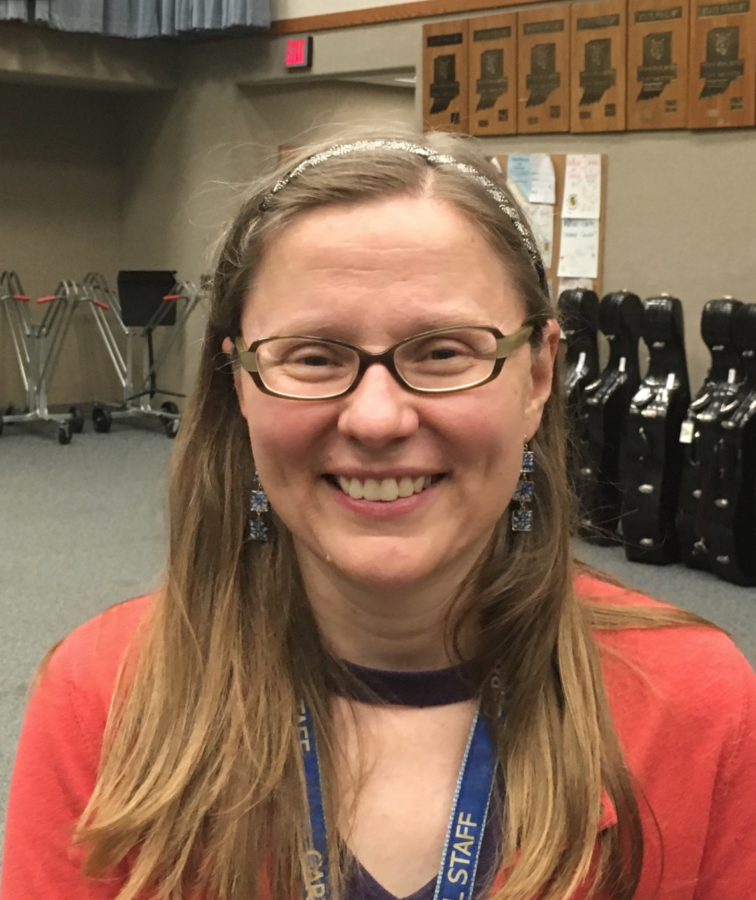Elisabeth Ohly-Davis, Orchestra Director
How has 9-11 impacted the nation’s perspective on safety?
Literally one week before 9-11, my then-boyfriend, now-husband took a trip to California in one day–he flew out at 6 a.m., gave his conference presentation, bummed around downtown San Francisco and was back in Colorado by 11 p.m. The very next week, it took three to four hours to check into the airport. There was (the) National Guard with machine guns checking underneath the cars with mirrors to make sure nobody brought bombs in underneath their cars, and security was a lot more strict and you couldn’t take all these different things on the airplane. And I feel like over the past however many years, we’ve gotten pretty relaxed again, although there are still some of those rules
I feel like there are a lot more inconveniences since 9-11 in terms of travel to help keep us safe, but I also feel like we’ve relaxed again.
Things that are creeping in, and it’s partly the way cellphones have developed, just video surveillance is up. I feel like we’re being more watched.
I don’t think 9-11 directly impacted school safety. I didn’t really see any changes in school safety. I think school shootings changed the attitude toward that.
Brad Osborne, Bus Driver
Do you think that 9-11 affected school transportation?
“Absolutely. There are so many changes that go from the ways we check the buses long before students on the bus, to security we are aware of while the students are on the bus, it’s absolutely stepped up. We won’t let someone on (the bus) unless they’ve got the proper clearance. At Carmel, that means they have to have a note from the rider’s parents, and it has to be approved by the high school office, and I have to receive that to let them on. When somebody is unexpected, we know it’s a call for action.”
What sorts of transportation safety risks do you encounter?
“The first example that comes to my mind isn’t necessarily an access to the bus, but when kids drop their backpacks (at the bus) while they go socialize. That’s not a good thing. We don’t know what that backpack’s all about. And kids ought to keep their backpacks until they’re sitting on the bus.
“We don’t let people on the bus unless they’re the ones that are cleared to be on the bus. If we suspected something, we can instantly call for law enforcement. There are things going on that we do to keep you guys safe.
“Since 911 there has been a heightened awareness, but there have also been more products that are more sophisticated electronics to keep us safe. We know what we’re looking for. We are looking for anything out of the ordinary, and it doesn’t matter whether it’s on the route or somebody that approaches the bus. We’re always on alert.
“One of the things we have seen is cars that may look suspicious in places that they shouldn’t be. And a handful of us have experienced that we want to get a car investigated by police if we know it’s not supposed to be there in neighborhoods and near bus stops.
“One of the things that was an issue with 911 was people with another culture wanted to damage another group of people with a different culture. And there was little respect between the people who identified with each of those cultures. We talk about respecting others even though there are differences in their situations. I don’t want to create divides between cultures that are different; I want people to understand the different cultures, and therefore respect everyone on the bus.
We need to figure out ways to respect the other group that’s different from what I identify with, or with what anyone identifies with.
“We have tremendous training that is consistent; we’ve got it before every school year, we’ve got it before each calendar year is over, we have had crisis prevention and intervention training. We want to keep you guys safe. And kids deserve to have the peace that they know they’re gonna be safe. And a lot of that training we get is by video, and the enhancements of the video came from the awareness of the 9-11 stuff.
“By comparison, when I was a kid and rode the bus, they didn’t even have radios to talk to the base. They didn’t have cameras. It was a pretty difficult job back then, but they didn’t have the security and safety stuff that we do now.
“I think they’ve done a great job with policy. I think we’re the right people, right time, right place.”

































![AI in films like "The Brutalist" is convenient, but shouldn’t take priority [opinion]](https://hilite.org/wp-content/uploads/2025/02/catherine-cover-1200x471.jpg)









































![Review: “The Immortal Soul Salvage Yard:” A criminally underrated poetry collection [MUSE]](https://hilite.org/wp-content/uploads/2025/03/71cju6TvqmL._AC_UF10001000_QL80_.jpg)
![Review: "Dog Man" is Unapologetically Chaotic [MUSE]](https://hilite.org/wp-content/uploads/2025/03/dogman-1200x700.jpg)
![Review: "Ne Zha 2": The WeChat family reunion I didn’t know I needed [MUSE]](https://hilite.org/wp-content/uploads/2025/03/unnamed-4.png)
![Review in Print: Maripaz Villar brings a delightfully unique style to the world of WEBTOON [MUSE]](https://hilite.org/wp-content/uploads/2023/12/maripazcover-1200x960.jpg)
![Review: “The Sword of Kaigen” is a masterpiece [MUSE]](https://hilite.org/wp-content/uploads/2023/11/Screenshot-2023-11-26-201051.png)
![Review: Gateron Oil Kings, great linear switches, okay price [MUSE]](https://hilite.org/wp-content/uploads/2023/11/Screenshot-2023-11-26-200553.png)
![Review: “A Haunting in Venice” is a significant improvement from other Agatha Christie adaptations [MUSE]](https://hilite.org/wp-content/uploads/2023/11/e7ee2938a6d422669771bce6d8088521.jpg)
![Review: A Thanksgiving story from elementary school, still just as interesting [MUSE]](https://hilite.org/wp-content/uploads/2023/11/Screenshot-2023-11-26-195514-987x1200.png)
![Review: "When I Fly Towards You", cute, uplifting youth drama [MUSE]](https://hilite.org/wp-content/uploads/2023/09/When-I-Fly-Towards-You-Chinese-drama.png)
![Postcards from Muse: Hawaii Travel Diary [MUSE]](https://hilite.org/wp-content/uploads/2023/09/My-project-1-1200x1200.jpg)
![Review: "Ladybug & Cat Noir: The Movie," departure from original show [MUSE]](https://hilite.org/wp-content/uploads/2023/09/Ladybug__Cat_Noir_-_The_Movie_poster.jpg)
![Review in Print: "Hidden Love" is the cute, uplifting drama everyone needs [MUSE]](https://hilite.org/wp-content/uploads/2023/09/hiddenlovecover-e1693597208225-1030x1200.png)
![Review in Print: "Heartstopper" is the heartwarming queer romance we all need [MUSE]](https://hilite.org/wp-content/uploads/2023/08/museheartstoppercover-1200x654.png)




